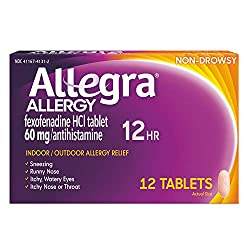
Allergies are a nuisance to both humans as well as our furry friends. Allergies are a fairly common ailment among dogs. While some breeds may be more prone to allergies than others, almost members of all dog breeds display allergic reactions at some point in their lifespan. An allergy flare-up can be quite troublesome.
Allegra is a known allergy medication used to treat allergy symptoms in humans. It may also be prescribed for dogs. However, dog parents wonder about the safety of the drug’s usage. Let us go through this Allegra guide to understand the drug’s effectiveness and safety better.
Types of Allergies in Dogs
Allergies in dogs can be caused by food or environmental factors. Your dog can be allergic to a host of different allergens. The symptoms of allergies in dogs range from skin irritations, itchiness, development of inflamed hotspots on the skin, runny nose, watery eyes, fevers, etc.
Some allergies can be caused by environmental allergens that produce symptoms like paw licking, itching, red and itchy eyes, sneezing soreness, vomiting and others. Itchiness is by-far the most common symptom of allergies caused by environmental factors. It can be treated with antihistamines if your vet deems it fit for your dog.

The important thing to remember is to avoid self-diagnosis. Do not read into the symptoms and start administering allergy medication. These symptoms may be caused due to other possible ailments.
You should always rely on the professional evaluation of your pooch. Do not self-medicate until the vet has seen your dog and prescribed suitable medication.
What is Allegra?

Commonly used as a drug to combat the symptoms of allergies in humans, Allegra is also used in dogs to fight allergies. Allegra is a second-generation antihistamine used to treat allergies.
The drug contains fexofenadine as an active agent. While Allegra does not cure allergies, it is effective in treating the symptoms. Although the drug has not been approved by the FDA to be used for dogs, vets commonly prescribe it to reduce the symptoms- especially for allergic rhinitis in dogs.
How Does Allegra Work?
Allegra works to alleviate the symptoms of allergies in dogs. Allergies produce symptoms like a runny nose, itchy throat, hay fever, skin irritations- the discomfort of all these symptoms are reduced by Allegra.
The drug however cannot cure allergies, but only offers relief from its symptoms. It can help reduce the itchiness caused by dermatitis. Dermatitis can be caused due to several allergens like food, fleas or other environmental factors. Dermatitis hotspots can be treated by Allegra.
Role of Antihistamines in Allegra

Antihistamines work to stop the production of proteins called histamines. The body’s immune response is effectively blocked by this formula. It essentially reduces the excessive immune response triggered by the body against the allergen.
Moreover, as Allegra is a second-generation antihistamine it avoids the pitfalls of the first-generation varieties of the drug. This involves eliminating the drowsiness caused by the first-generation antihistamines.
Is Allegra Safe for Dogs?
Allegra is a fairly common drug used to deal with the symptoms of allergies in humans. However, data on the effectiveness and safety of the drug for dogs are quite limited.
A few studies suggest that fexofenadine is safe to be used in dogs. The studies showed that the drug proved to be more effective in treating allergy-caused itching in dogs as compared to methylprednisolone.

A recent study concluded that Allegra works on dogs with allergies in the same way as it does in humans. There are a few minor differences that indicate that the drug can be further improved to produce better results in dogs. The problem, however, remains the limited trails that fail to produce all-encompassing results.
Dogs are known to react unpredictably to antihistamines. This makes choosing the right antihistamine to counter atopic dermatitis in your dog very difficult. The best way to ascertain the safety and suitability of any drug for your pooch is to consult the vet. Do not use any medication without the vet’s consent, as he knows the health and needs of your dog the best.
Antihistamines are also used to treat other symptoms like insomnia and motion sickness in dogs. This is known as the off-label use of the drug. Special medical supervision is recommended for such usage.
When to Use Allegra?

Allegra is known to work best at reducing the symptoms of atopic dermatitis and rhinitis in dogs. For best results, it should be administered before the itching worsens.
When Should I Avoid Allegra?
Allegra D should be actively avoided. This drug can be very harmful to your dog as it contains a decongestion- pseudoephedrine- that may affect your dog’s health. Allegra formula containing xylitol should also be avoided.
Children’s oral suspension formulation of the drug contains this chemical sweetener. This can be equally toxic for dogs and thus should be actively avoided. Xylitol can also be present in other variations of the Allegra tablets.
Make sure you check the list of chemical compounds in the drug before administering it to your pooch. The 30gm oral dissolvable Allegra tablets that are commonly prescribed for humans should also be avoided as they may be difficult for your dog to ingest.

You should actively avoid administering Allegra to your dog if she is pregnant or lactating. Pups under the age of one year should not be administered Allegra without the vet’s prescribed instruction.
Similarly, dogs suffering from kidney problems should not be given the drug. In large dosages, Allegra can affect heart function in dogs. It should be avoided for dogs who suffer from heart ailments. Allegra may interact adversely with antacids, erythromycin and ketoconazole.
The vet should evaluate your dog’s medical history and current medicine regime to prescribe a safe antihistamine. He knows the other medication your dog is on, hence he will be able to prescribe an anti-allergy medication that doesn’t affect or interact adversely with its existing medical routine.
Dosage of the Drug
No specific dosage chart exists for Allegra when being administered to dogs. The vet’s advice is the best way to formulate a schedule and administer the drug. Allegra is given at a rate of 1 to 1.25gms per pound of body weight, every 24 hours.
Often the dosages are varied according to the size of your dog. For a smaller dog, the daily dosage may range from 1 tablet to 1.5 tablets for a medium dog and finally 2 tablets for a large dog.
Sometimes the whole dosage can be administered at once or it can be split during the day. However, the dosage may be altered according to the needs of your dog, his age, other ailments, etc. by the vet’s orders.
Possible Side Effects of Allegra
Due to the dearth of specific research on the effects of the drug on canines, the side effects known are few and similar to those in humans. There may be other side effects of the drug in dogs that have not been discovered. Some common side effects of Allegra usage in dogs are:
- Headaches
- Indigestion
- Vomiting
- Nausea

If your dog suffers from any of the above-listed side effects or displays some other ones, you should consult the vet immediately.
Where Can I Purchase Allegra?
Allegra is sold as an over-the-counter drug at pharmacies. However, your vet may keep a supply of generic fexofenadine that may be better suited for your dog than the pharmacy variant. The difference is that the generic version is available as 30g and 60g tablets, while the pharmacy version contains 180g fexofenadine.
Alternatives to Allegra

Your dog’s allergy symptoms can be managed with other alternatives like bathing him more frequently, washing his bedding more often, feeding him an Omega-3 rich diet.
You can also ask your vet for alternative medication – like Benadryl or other corticosteroids- to treat the symptoms of allergies. Sometimes certain antihistamines work better than others.
You may need to experiment with several different ones before finding the perfect match. However, always defer to your vet’s advice for such trials.
Conclusion

Allergies in dogs can be quite unsettling. Allegra can be used to effectively relieve the discomfort of the allergy symptoms. But you should avoid Allegra D and the ones containing xylitol, as they are extremely harmful to your pooch. You should actively avoid self-medicating.
Sometimes symptoms of other ailments can be mistaken as symptoms of allergies. Make sure to consult the vet and conduct necessary tests to ascertain the cause of these symptoms. Although Allegra is considered to be relatively safe, do not administer it without the vet’s approval.
The dosage of the drug must be determined by the vet and should not be altered. If your dog experiences any side effects of the drug, discontinue its use and inform the vet immediately. Try using other alternatives to reduce instances of allergy flare-ups in your dog. If environmental allergens are responsible for his allergies, try keeping his coat and bedding clean.
Precautions are always better than hunting for a cure. If your dog is prone to food allergies, avoid the allergy-causing foods completely. To effectively deal with the problem of recurrent allergies in your dog, work with his vet to devise a plan-of-action to tackle these flare-ups.
Table of Contents